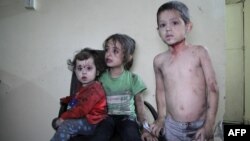UN debates reviving Syrian cease-fire after U.S.-Russia effort ends
| Publisher | Radio Free Europe/Radio Liberty |
| Publication Date | 4 October 2016 |
| Cite as | Radio Free Europe/Radio Liberty, UN debates reviving Syrian cease-fire after U.S.-Russia effort ends, 4 October 2016, available at: https://www.refworld.org/docid/5975a0666.html [accessed 8 June 2023] |
| Disclaimer | This is not a UNHCR publication. UNHCR is not responsible for, nor does it necessarily endorse, its content. Any views expressed are solely those of the author or publisher and do not necessarily reflect those of UNHCR, the United Nations or its Member States. |
October 04, 2016
 Wounded Syrian children wait to receive treatment at a hospital following a reported air strike on the rebel-held northwestern city of Idlib on September 29.
Wounded Syrian children wait to receive treatment at a hospital following a reported air strike on the rebel-held northwestern city of Idlib on September 29.
The United Nations Security Council sought to salvage a cease-fire in Syria after the United States announced it would no longer work with Russia to do so, but Moscow quickly moved to block the UN effort.
France and Spain sought the UN council's approval on October 3 for a measure that would immediately stop the air campaign over the Syrian city of Aleppo, where dozens have been killed by devastating air strikes in recent days, but Russia said it had "no chance of working."
The UN's envoy for Syria, Staffan de Mistura, said he "deeply regrets" the failure of U.S.-Russian diplomatic efforts to revive a cease-fire but said he will continue to push "energetically for a political solution" and "will never abandon the Syrian people to a destiny of endless violent conflict."
France's UN Ambassador Francois Delattre said, "We consider that this is our responsibility to do absolutely everything we can do, everything humanly possible to unite the Security Council behind our efforts to end the martyrdom in Aleppo" with the suspension of all air strikes.
But Russia's UN Ambassador Vitaly Churkin, who holds the rotating Security Council presidency for the month of October, quickly raised objections.
A resolution "singling out aviation, where terrorists [on the ground] would be allowed to do whatever they want, would not be a very attractive proposition," he said.
"I am not even sure many other Security Council members would like to see a resolution on cessation of hostilities that has no chance of working. If you pass a resolution, you expect something to happen."
Churkin declined to say whether Russia would veto the measure in a council vote later this week but repeated that grounding planes would constitute a unilateral disarmament that Moscow will not accept.
"Stronger concerted action against terrorists" would be a better way to address the crisis in Syria, Churkin said.
Syrian President Bashar al-Assad's forces, backed by Russia warplanes and Iranian support, have been battling to capture eastern Aleppo, the rebel-held half of Syria's largest city, where more than 250,000 civilians are trapped.
The relentless Russian and Syrian air campaign since a tentative cease-fire collapsed last week has badly damaged hospitals and water supplies.
The draft UN resolution expresses "outrage at the unacceptable and escalating level of violence and at the intensified campaigns, in recent days, of aerial bombings in Aleppo" and demands that "the Syrian government end all aerial bombardments, in order to facilitate safe and unhindered humanitarian access."
French Foreign Minister Jean-Marc Ayrault blamed Russia for air attacks over the weekend on the largest hospital in rebel-held Aleppo, as well as strikes on White Helmet rescue volunteers whom Syria and Russia have labeled as "terrorists."
"I call on Russia to take responsibility. The bombardment of hospitals is a war crime. Is Russia going to bear the responsibility for such intolerable acts?" Ayrault asked.
British UN Ambassador Matthew Rycroft said he hoped the draft cease-fire resolution will be adopted in the coming days but acknowledged that "even that is not going to not end the war" that has killed more than 250,000 people in 5 1/2 years.
"What will end the war is not another piece of paper. It's a change of mindset, it's a change of heart, and it's a decision, actually, to fulfill every single existing obligation. And if everyone around the Security Council table did that, then the war in Syria would be over very rapidly," he said.
While the UN debated the new cease-fire measure, Moscow and Washington exchanged blame for the failure of their diplomatic effort to revive peace.
The United States, in suspending the talks on October 3, said Russia had failed to live up to its commitment in a tentative cease-fire agreement reached on September 9 to halt fighting and ensure that aid reached besieged communities in Aleppo.
"Unfortunately, Russia failed to live up to its own commitments . . . and was also either unwilling or unable to ensure Syrian regime adherence to the arrangements to which Moscow agreed," said U.S. State Department spokesman John Kirby.
"Everybody's patience with Russia has run out," said White House spokesman Josh Earnest.
But Russian Foreign Ministry spokeswoman Maria Zakharova charged that Washington was unwilling or unable to keep its part of the deal requiring it to separate so-called moderate rebel groups it supports from the designated terrorist group Al-Nusra Front, Al-Qaeda's affiliate in Syria, which is allied with other rebel groups in Aleppo.
Zakharova said Washington also failed to persuade rebel groups under its influence to pull back from Castello Road, a key artery that was envisaged as the route for providing humanitarian aid to Aleppo under the September 9 tentative deal.
"Washington's inaction enabled militant groups in the city to regroup, get weapons, and mobilize their resources," she said.
"Washington simply did not fulfill key conditions of the agreement," Zakharova said. "After failing to fulfill the agreements that they themselves worked out, they are trying to shift responsibility on to someone else."
With reporting by AP, Reuters, AFP, Interfax, and dpa
Link to original story on RFE/RL website
